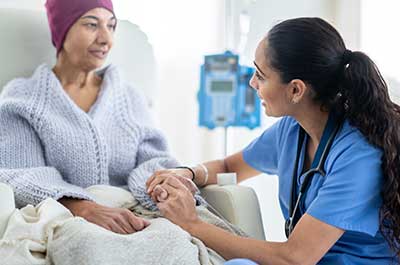When facing a life-changing cancer diagnosis, you’re bound to have a lot of questions. Emotional questions likely come to mind first, like ‘what’s going to happen to me?’ and ‘how serious is my cancer?’ Then there are practical questions: ‘where should I go for treatment?’ and ‘what will I do about insurance?’
Before you start mapping out a treatment plan, however, it’s a good idea to get a second opinion – a step that’s crucial but often overlooked.
“All good physicians encourage second opinions,” says Richard Berri, M.D., a surgical oncologist at Henry Ford Health. “If any of our family members – or ourselves – were diagnosed, we would all be getting second opinions.”
But despite how vital another assessment can be, plenty of people don’t seek one out. Why? Some feel pressure to start treatment immediately and don’t want to stall. Others are afraid that seeking advice from another doctor might offend their current physician and impact their relationship.

Cancer Care At Henry Ford
Regardless, Dr. Berri says when facing a serious illness like cancer, nothing should stand in your way of receiving care that provides the greatest opportunity for success and makes you feel comfortable. Here are five reasons why getting a second opinion should be a top priority on your road to recovery.
- A second opinion can give you peace of mind. A cancer diagnosis is scary, and even if you feel like you’ve already found the right team, you may want reassurance to quell the ‘what-ifs.’ “Sometimes a second opinion is important not because you’re going to be offered something different, but just to confirm what your original team has already said,” says Dr. Berri. “The confidence factor patients need as they start down a long journey of treatment makes a big difference in their outcome. If they’re constantly in doubt, anxious and second-guessing themselves, all kinds of complications can arise from that.”
- A second opinion may offer up-to-date treatment and technology. Our knowledge about cancer and how to treat it is changing rapidly. Every year, new studies provide insight that can lead to more effective treatment. “One physician or one hospital might not be better or worse than another, but they may not know about a new treatment because of the rapid fire breakthroughs that are happening,” says Dr. Berri. “While seeking a second opinion, you may learn of a new technology available near you that’s only recently emerged.”
- A second opinion can offer a different perspective. Most of the time, successful treatment is not the result of just one doctor’s efforts. Instead, it requires a team of oncologists, surgeons, nurses and more who each bring a different perspective and approach to treatment. “The patients who do best do well because they’ve had a multidisciplinary approach,” says Dr. Berri.
- A second opinion may give you access to clinical trials. Clinical trials (real-world research studies involving people) allow doctors to determine new approaches in preventing, diagnosing and treating diseases. Oftentimes, cancer patients who seek second opinions at different facilities will learn of a current or upcoming clinical trial that’s right for them. “Some hospitals, doctors or teams can offer certain clinical trials for advanced cancer therapy that might not be offered elsewhere or that other places might not even know about,” says Dr. Berri.
- A second opinion can give you a plan you feel more comfortable with. If the first opinion you receive fills you with fear or doubt, know that another doctor might have a different approach in mind. And just because one doctor suggests an unsettling prognosis, another doctor might offer more hope. “There’s a lot of hope out there,” says Dr. Berri. “There are a lot of breakthroughs. But patients have to do their homework in terms of where these procedures are being offered.”
No matter how or where you get a second opinion, newly diagnosed patients should take solace knowing there’s more hope for cancer treatment and cancer diagnosis today than ever before.
“Patients are being cured more often, they’re living longer, and a lot of cancers are being turned into a chronic disease,” says Dr. Berri. “But the only way for that good outcome to happen is by getting access to innovative, cutting-edge treatments. And the only way to do that is to make sure you’ve gotten various opinions, to know that you’re at a place that’s offering those advanced therapies. We always encourage patients to get a second opinion because ultimately, it is their choice on whether or not to move forward with a treatment plan. There can be many different ways to approach treatment and it is important that patients understand all options.”
Reviewed by Richard Berri, M.D., Chief of Surgical Oncology and Director of the Hyperthermic Intraperitoneal Chemotherapy (HIPEC) program at Henry Ford St. John Hospital.



